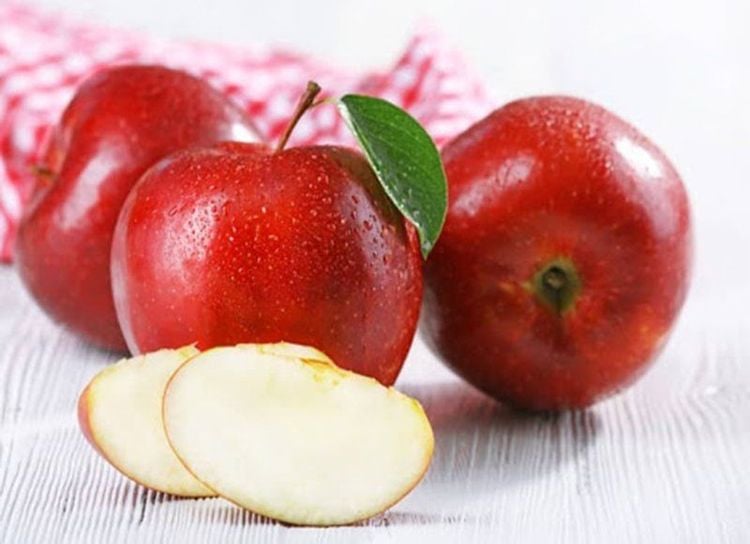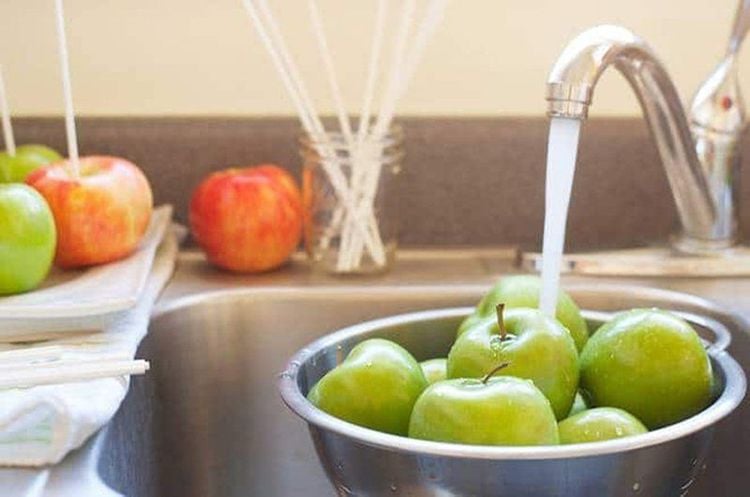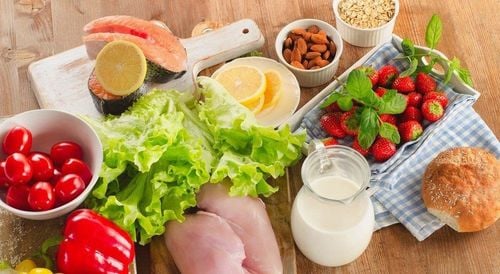During pregnancy, the development of the baby depends on you to provide essential nutrients. That’s why it’s important to make the best food choices for both your baby and yourself. A balanced diet rich in fruits and vegetables is crucial because these foods, including apples, contain many of the nutrients you and your baby need to stay healthy.
1. Benefits of Eating Apples During Pregnancy
To maintain maternal health and support the baby’s development, pregnant women should follow a healthy diet that includes nutritious foods and avoid foods with empty calories. Scientific studies have shown that if you primarily consume junk food during pregnancy, it can predispose your child to a lifelong preference for fats and sugars.
Fruits and vegetables are packed with essential nutrients recommended for daily meals, and they can also serve as a healthy alternative to junk food during pregnancy. Including a variety of these foods in your diet ensures that you receive most of the necessary nutrients, such as vitamins, minerals, and fiber, required by both you and your baby for maintenance and growth.
Moreover, eating fruits and vegetables helps prevent constipation, a common pregnancy symptom.
Apples are rich in fiber and provide vitamin C, contributing to your daily nutritional intake. Additionally, apples contain pectin, known as a prebiotic that promotes healthy gut bacteria. For maximum nutritional benefit, eat apples with their skin on, ensuring they are thoroughly washed and meet food safety standards.
So, should you eat apples during pregnancy? Many studies have shown that eating apples not only offers health benefits to the mother but also reduces potential health risks for the child.

2. Eating Apples During Pregnancy Helps Reduce the Risk of Wheezing and Asthma in Children
Recent research has concluded that mothers who eat apples during pregnancy may protect their children from developing asthma later in life. This longitudinal study tracked the diets of nearly 2,000 pregnant women and then examined how maternal diets affected respiratory development in over 1,200 of their children five years later. Among the various foods consumed and recorded by pregnant women, researchers found that children of mothers who ate apples had a significantly lower risk of developing asthma and wheezing.
The study focused on medical assessments of asthma and related symptoms (such as wheezing) when the children reached the age of five. According to the study's findings, aside from apples, no consistent association was found between the prenatal consumption of other healthy foods and asthma in the 1,253 children evaluated.
Researchers from institutes in the Netherlands and Scotland noted that children of mothers who consumed apples during pregnancy were less likely to exhibit asthma symptoms, including wheezing. These same researchers had previously reported a positive link between maternal intake of vitamins A, E, D, and the mineral zinc with a reduced risk of asthma, wheezing, and eczema in children.
The only other positive association found between prenatal food consumption and reduced risk in children was with fish. The researchers observed that children of mothers who ate fish had a lower rate of doctor-diagnosed eczema.
According to the study: "The current research shows a beneficial link between maternal apple consumption during pregnancy and reduced wheezing and asthma when the children are five years old." The researchers added that their findings suggest a specific effect of apples, potentially due to their phytochemical content, such as flavonoids. The research also cited other studies related to apples, including those that found apple consumption as a significant source of flavonoids and other beneficial polyphenols associated with asthma, bronchial hyperreactivity, and improved lung function in adults.
The National Center for Health Statistics reports that nine million U.S. children have been diagnosed with asthma at some point in their lives, with four million experiencing asthma attacks in a given year. Others suffer from undetected or undiagnosed asthma, known as hidden asthma, according to the American Lung Association. The burden of this disease is significant—statistics show that asthma is the third leading cause of hospitalization for children under 15 and a major cause of school absences.
3. Some Safe Tips for Using Fruit
Eating apples is beneficial for pregnant women, so when deciding to include apples in your daily meals, you may opt for organic fruit that hasn’t been treated with pesticides or chemical fertilizers. However, keep in mind that eating non-organic fruit is still much better than not eating fruit at all. To reduce the risk of consuming pesticide residues or bacteria on fruits, especially apples, you can follow these safety tips:
- Wash fruit thoroughly, even if it has been pre-washed.
- Discard any fruit with bruised areas, as bacteria may be hiding in these spots.
- Only drink pasteurized or boiled fruit juice.
- Store fresh fruit in the refrigerator, keeping it away from raw meat to minimize the risk of cross-contamination.

4. Risks and Considerations When Eating Apples
Consuming apples, especially for pregnant women, generally does not pose serious side effects for most people. However, some individuals may need to take precautions. Here are some potential risks when eating apples:
Toxins:
Apple seeds contain cyanide. While swallowing whole apple seeds is unlikely to cause harm, chewing and swallowing large quantities of seeds may be dangerous.
Allergies:
Some people may experience allergic reactions after eating apples. Anyone experiencing medical issues such as hives, swelling, or difficulty breathing should seek medical attention immediately. If the condition develops into anaphylaxis, it can be life-threatening.
Dental Plaque:
It was once believed that eating apples could help remove plaque from teeth. However, studies have not found conclusive evidence supporting this. Therefore, brushing your teeth regularly remains the best way to prevent plaque buildup. Additionally, the acid content in apples may contribute to plaque accumulation on teeth. To prevent this, rinse your mouth with water or brush your teeth after eating apples.
Choking:
Young children and elderly individuals may have difficulty swallowing and are at higher risk of choking on raw apple pieces. Using unsweetened applesauce or other cooked apple forms may be a safer alternative.
Eating fruit during pregnancy, including apples, helps ensure that both you and your baby stay healthy and ready for the new life ahead. Fresh, frozen, and canned fruits are all good options for your pregnancy diet. However, make sure no sugar is added to canned or frozen fruits.
To arrange an appointment, please call HOTLINE or make your reservation directly HERE. You may also download the MyVinmec app to schedule appointments faster and manage your reservations more conveniently.
References: healthline.com, medicalnewstoday.com, babycenter.com













